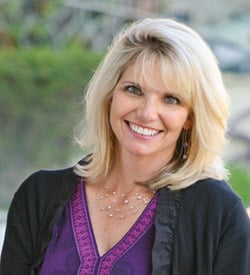It Feels Good to Share

Patricia Kosich: Found balance, kept it. (Photo by Jonah Light)
In some respects, Patricia Kosich looks back fondly on her cancer treatment. She understands her attitude is likely to raise eyebrows, but she has good reasons for feeling that way.
And she’s willing to share those reasons. Kosich is one of 11 lawyers whose survival stories were posted on the ABA website this summer by the Breast Cancer Task Force in the Section of Health Law. She is a vice-chair of the section’s Breast Cancer Initiatives Executive Committee.
Kosich was diagnosed with breast cancer three years ago, around the time of her 42nd birthday. She was a third-year associate at Foley & Lardner in Los Angeles and a single mom raising her 9-year-old daughter.
“As a single mother with a 90-mile round-trip commute each day to a job with all the billable pressures typical of law firm life, I was exhausted,” Kosich writes in her online survivor story. She resisted when her physician recommended she go on disability leave during treatment that would involve multiple surgeries and six months of chemotherapy and radiation. She didn’t want to feel guilty and view herself as a failure for not being able to continue working.
But Kosich finally relented, and she stayed home for the entire course of treatment in what she describes as “the very best decision I have ever made in my life for both my daughter and myself.” She emphasizes that the support of her law firm and its generous disability package made it possible to take a leave of absence during her treatment.
Kosich, now a senior counsel for global commercial operations at Amgen, a biotechnology company in Thousand Oaks, Calif., writes that looking back on her experience with cancer helps her recognize her own personal growth. “It was the first time in my adult life that I wasn’t holding myself to an unachievable standard of self-sufficiency and perfectionism.”
REMEDY FOR FEAR, ISOLATION
The women who have posted their stories are members of a “very powerful sisterhood,” says Shelley K. Hubner, who chairs the breast cancer committee. “These women are really unsung heroes,” she says. “Some of them faced uncanny problems—I mean unbelievable problems—and they tackled them, learned from them, grew from them, helped others because of them.”
The aim of the project, Kosich says, is to instill hope in other lawyers fighting breast cancer and to ease their fears and feelings of isolation. The varied stories show different ways lawyers have managed career, family and treatment, suggesting there is no “right way” to juggle all the demands. While Kosich is happy she opted for time off from work, another lawyer tells of being “bitterly disappointed and even hurt” when a senior partner suggested she go on disability.
The project recognizes that lawyers with cancer experience unique issues because of the extensive hours and pressures of law practice. “The practice of law can be very challenging,” says Hubner, special counsel at Sedgwick, Detert, Moran & Arnold in San Francisco. “I think it’s fair to say that as lawyers we’re expected to be strong; we’re not expected to show our weaknesses—clients look to us for that.”
Kosich identifies with each woman’s instinct to survive. “They looked at this as an opportunity to continue their personal growth and really fight and get to the other side of this diagnosis,” she says.
In her story, Kosich describes her own personal growth: “The balance I insisted on during treatment has lasted post-treatment—but that wouldn’t have happened had I insisted on my usual approach of stoically overachieving. I am practicing in-house now and have a 4-mile round-trip commute. I walk to work sometimes, and life has never felt better for my daughter and me.”



